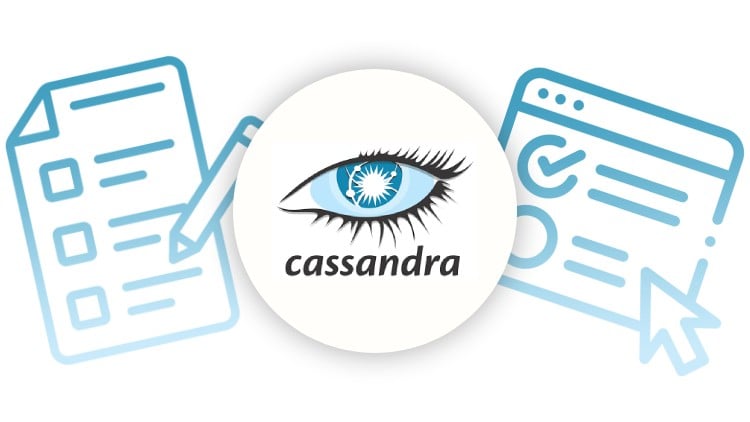
Apache Cassandra 3.x Developer Associate Certification | 120 unique high-quality test questions with explanations!
⭐ 4.10/5 rating
👥 1,641 students
🔄 June 2025 update
Add-On Information:
Note➛ Make sure your 𝐔𝐝𝐞𝐦𝐲 cart has only this course you're going to enroll it now, Remove all other courses from the 𝐔𝐝𝐞𝐦𝐲 cart before Enrolling!
- Course Overview
- This course is meticulously engineered to provide comprehensive preparation for the Apache Cassandra 3.x Developer Associate Certification Test.
- It offers an unparalleled resource of 120 unique, high-quality test questions, each paired with detailed explanations to solidify your understanding.
- The curriculum is designed to not only test your knowledge but also to deepen your comprehension of Cassandra’s core architectural principles and developer-centric functionalities.
- Through rigorous practice, you will master the nuances of Cassandra Query Language (CQL), data modeling best practices, and the intricacies of its distributed nature.
- Leveraging a proven 4.10/5 rating from 1,641 students, this course has a track record of effectively guiding learners towards certification success.
- The material is regularly updated, with the latest refresh in June 2025, ensuring you are studying the most current and relevant content aligned with the exam objectives.
- This preparation focuses on building conceptual clarity and practical problem-solving skills, crucial for both passing the exam and excelling as a Cassandra developer.
- Requirements / Prerequisites
- A foundational understanding of database concepts, including familiarity with either SQL or other NoSQL paradigms, is highly beneficial.
- Basic programming experience in any modern language will aid in grasping application-related Cassandra concepts.
- Familiarity with command-line interfaces (CLI) is recommended for conceptualizing interactions with Cassandra tools.
- Access to a stable internet connection and a personal computer for accessing course materials.
- An eager and dedicated mindset for learning about distributed database systems and NoSQL architectures.
- No prior hands-on Cassandra administration or cluster setup experience is assumed, as the focus is purely on the developer associate perspective.
- Skills Covered / Tools Used
- Advanced Cassandra Data Modeling: Develop sophisticated schemas, including keyspace design, table structures, effective use of primary keys, clustering columns, secondary indexes, User-Defined Types (UDTs), and collection types for optimal performance.
- Mastery of Cassandra Query Language (CQL): Achieve expert proficiency in DDL (Data Definition Language) for schema management, DML (Data Manipulation Language) for robust data interactions, and fundamental DCL (Data Control Language) concepts.
- Deep Understanding of Cassandra Architecture: Grasp the distributed nature of Cassandra, including node roles, data replication strategies, consistency levels (e.g., ONE, QUORUM, LOCAL_QUORUM), and the implications of eventual consistency on application design.
- Performance Optimization Techniques: Learn to identify and mitigate performance bottlenecks through efficient query writing, thoughtful data model design, and understanding Cassandra’s internal mechanisms like memtables, SSTables, and compaction.
- Effective Error Handling and Transaction Management: Implement strategies for robust error handling in Cassandra applications and understand the use cases and limitations of Lightweight Transactions (LWTs) for conditional updates.
- Developer-Centric Administrative Insights: Gain knowledge of relevant
nodetoolcommands for basic monitoring, diagnostics, and understanding cluster health from a developer’s perspective. - Application Integration Concepts: Understand the principles behind connecting applications to Cassandra using client drivers, including connection pooling, retry policies, and statement execution.
- Security Fundamentals: Comprehend basic security considerations for Cassandra, such as user authentication and authorization, relevant to application development.
- Strategic Test-Taking: Develop a systematic approach to analyzing certification questions, managing time effectively, and selecting the most accurate answers under exam conditions.
- Tools (Conceptual): Apache Cassandra 3.x, CQLSH,
nodetool(developer commands), Cassandra client drivers (conceptually).
- Benefits / Outcomes
- Successfully pass the Apache Cassandra 3.x Developer Associate Certification Exam, earning a valuable industry credential.
- Validate and officially recognize your expertise in developing scalable, high-performance applications with Cassandra 3.x.
- Significantly enhance your professional standing and open doors to advanced career opportunities in the burgeoning NoSQL and distributed systems fields.
- Gain profound confidence in your ability to design, implement, and troubleshoot complex Cassandra data models and application logic.
- Acquire a solid foundation in Cassandra that serves as a springboard for further specialization in distributed database technologies.
- Equip yourself with practical insights and a deep theoretical understanding to contribute effectively to real-world projects leveraging Cassandra’s powerful capabilities.
- Demonstrate to employers your commitment to mastering cutting-edge database technologies, positioning you as a highly skilled and desirable candidate.
- PROS
- Highly Targeted Certification Prep: Directly focuses on equipping you to pass the Cassandra 3.x Developer Associate exam with confidence.
- Extensive Practice Questions: Features 120 unique, high-quality test questions, each with thorough explanations, providing invaluable learning through practice.
- Up-to-Date Content: Guaranteed relevance with regular updates, including the latest refresh in June 2025, mirroring current exam standards.
- Flexible Learning: Self-paced format allows you to study at your convenience, fitting into busy professional schedules.
- Industry Recognition: Certification significantly boosts your professional credibility and marketability in the tech industry.
- CONS
- Primarily functions as a certification test preparation tool, which means extensive hands-on project work might not be a central component of the course.
Learning Tracks: English,IT & Software,IT Certifications
Found It Free? Share It Fast!